
Good morning, class. Today begins the roughly three days we have allotted by our state-mandated curriculum to cover the causes, major events, and impact of the American Civil War.
Unlike past units in which I’ve sometimes been guilty of inflicting my personal opinions and interpretations on your instead of just teaching you history, I’ll be making every effort to present the facts and only the facts. Evaluation, analysis, synthesis, or conclusions are entirely up to you. We’ve practiced these skills through structured activities, and you already, no doubt, supplement my unwittingly biased and inadequate methods via long, meaningful discussions with your parents and/or clergy, as well as extensive research of your own. Hopefully that will mitigate some of the ongoing damage I’ve done as a bumbling, leftist, possibly atheistic public school educator out to destroy American values.
It’s not my job to teach you what to think, after all – just to present everything that’s ever happened anywhere in or to our great nation in more or less chronological order without prioritization or unnecessary commentary.
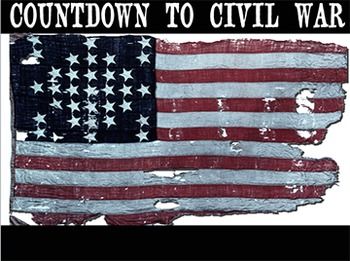
The 1850s: Countdown to Civil War
In 1850, the U.S. census showed a population of 23,191,876.
In 1840 – 17,063,353.
In 1830 – 12,866,020.
In 1820 – 9,638,453.
In 1810 – 7,239,881.
Rather than me inflict my personal interpretations on which elements of this growth were significant, I refer you to the U.S. Census Bureau for more details and to several biased-but-comprehensive overviews of U.S. History which you may read in order to make up your own mind.
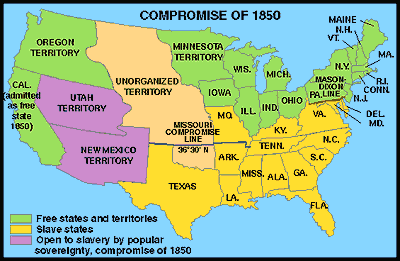 On January 29, 1850, Henry Clay proposed the Compromise of 1850 to Congress. It was a collection of five bills he said would help prevent further conflict between the North and the South. Texas gave up its claims to New Mexico and other areas north of the Missouri Compromise line and the U.S. took over their remaining debts. California was admitted to the Union as a free state. Utah and New Mexico would enter the U.S. under the principal of ‘popular sovereignty’ – meaning the people in each would vote for whether or not to have slavery. The slave trade, but not slavery itself, was banned in the District of Columbia. A much tougher Fugitive Slave Act was enacted.
On January 29, 1850, Henry Clay proposed the Compromise of 1850 to Congress. It was a collection of five bills he said would help prevent further conflict between the North and the South. Texas gave up its claims to New Mexico and other areas north of the Missouri Compromise line and the U.S. took over their remaining debts. California was admitted to the Union as a free state. Utah and New Mexico would enter the U.S. under the principal of ‘popular sovereignty’ – meaning the people in each would vote for whether or not to have slavery. The slave trade, but not slavery itself, was banned in the District of Columbia. A much tougher Fugitive Slave Act was enacted.
The North is generally perceived to have responded badly to the Fugitive Slave Act, which the South generally favored. I’ll refrain from elaborating further for fear I’d be injecting my own interpretations and biases into the matter. It’s not my job to tell you what to think, just to teach you history!
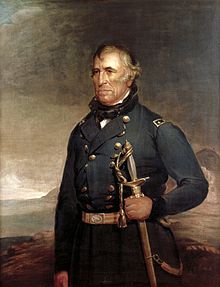 President Zachary Taylor died unexpectedly in July of 1850 of what seemed to be a stomach-related illness. Some suggested he may have been assassinated by pro-slavery southerners, and various theories have persisted into modern times. In 1991, Taylor’s body was exhumed and tests were done in an effort to determine whether or not he had, in fact, been poisoned. The science found no evidence of malicious behavior, but some question the results even today.
President Zachary Taylor died unexpectedly in July of 1850 of what seemed to be a stomach-related illness. Some suggested he may have been assassinated by pro-slavery southerners, and various theories have persisted into modern times. In 1991, Taylor’s body was exhumed and tests were done in an effort to determine whether or not he had, in fact, been poisoned. The science found no evidence of malicious behavior, but some question the results even today.
In an effort to avoid telling you what to believe, I’ll avoid further commentary, possibly having already said too much in favor of something as unsettled as medical science and wishing to give fair and equal treatment to every possible interpretation or theory related to this issue. You are encouraged to devote months of your life to researching the chemistry involved, the nature of the various organizations who’ve published opinions, and the history of Presidential assassination on your own in order to develop your own enlightened viewpoints free from my corrupting influence.
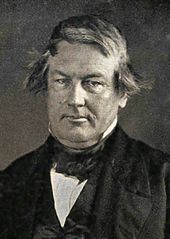 On July 10, 1850, Millard Fillmore was sworn into office as the 13th President of the United States. Neither expansionists nor slave-holders were generally happy with his publicly stated policies regarding slavery, although it would be wrong of me to try to speak for them or evaluate their reasoning.
On July 10, 1850, Millard Fillmore was sworn into office as the 13th President of the United States. Neither expansionists nor slave-holders were generally happy with his publicly stated policies regarding slavery, although it would be wrong of me to try to speak for them or evaluate their reasoning.
On September 9, 1850, the Compromise of 1850 is passed – see previous elaboration, in which I’ve tried to be fair to all sides. I hope, by mentioning it again here I’m not unjustly suggesting it was more or less important than any other event, or that certain parts of it were good or bad or had any particular impact. Those sorts of discussions are best left to the family hearth.
 On September 11, P.T. Barnum introduced Jenny Lind to American audiences. Often called the “Swedish Nightingale,” Lind was a soprano who performed in Sweden and across Europe before her wildly popular concert tour of America. She donated many of her earnings to charities, especially the endowment of free schools in Sweden. Some people think that sort of philanthropy is noble; others find it less so. Best we not consider such issues here. Or the role of the arts in influencing culture or character.
On September 11, P.T. Barnum introduced Jenny Lind to American audiences. Often called the “Swedish Nightingale,” Lind was a soprano who performed in Sweden and across Europe before her wildly popular concert tour of America. She donated many of her earnings to charities, especially the endowment of free schools in Sweden. Some people think that sort of philanthropy is noble; others find it less so. Best we not consider such issues here. Or the role of the arts in influencing culture or character.
Too subjective.
While it is possible that Miss Lind’s singing success was unrelated to the outbreak of the Civil War nearly a decade later, it’s not my place to decide what events are or are not important; I’m paid to merely present the facts.
Then again, we’d better pick up the pace…
In May of 1851, the U.S. participated in the opening ceremony of the first World’s Fair in Hyde Park, London.
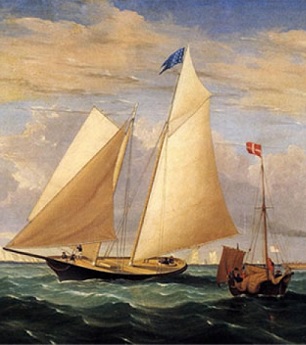 On August 22, 1851, a yacht named “America” won the first America’s Cup yach race, as things named “America” always should. This may have had an impact on different segments of the nation, or it may not have.
On August 22, 1851, a yacht named “America” won the first America’s Cup yach race, as things named “America” always should. This may have had an impact on different segments of the nation, or it may not have.
It would require an extensive study of available primary sources presenting various points of view in order to give a balanced interpretation regarding such an impact, or lack thereof. By my estimates that would require at least two weeks of class time, which the state-mandated curriculum does not allow. I will therefore abstain from projecting potentially slanted summaries of the nation’s reaction or speculating as to the impact or lack thereof this event may have had on the subsequent outbreak of war.
I fear we’re running short on time, so I’m going to condense a bit and hope you’re still getting enough to understand what caused the American Civil War.
November 1851 – Herman Melville’s Moby Dick is published in the United States, along with Nathanial Hawthorne’s House of Seven Gables. The painting “Washington Crossing the Delaware” is completed by German-American artist Emmanuel Leutze. These books and this painting are generally well-known, but every real American is entitled to their own opinion of their quality, their enjoyability, and what – if anything – each of them means or how they may or may not relate to the schisms leading to war.
 December 1851 – The first Y.M.C.A. opens in Boston, Massachusetts. This arguably reflected changing values and social strategies in northern cities – if we were going to talk about values, I mean. Which we won’t. Because… school. So, um… the Village People recorded “Y.M.C.A.” in 1978 and it became a huge disco hit. If you’ve ever been to a live sporting event, you’ve heard this song and watched people do weird things with their arms which they seem to think are related to the song.
December 1851 – The first Y.M.C.A. opens in Boston, Massachusetts. This arguably reflected changing values and social strategies in northern cities – if we were going to talk about values, I mean. Which we won’t. Because… school. So, um… the Village People recorded “Y.M.C.A.” in 1978 and it became a huge disco hit. If you’ve ever been to a live sporting event, you’ve heard this song and watched people do weird things with their arms which they seem to think are related to the song.
March 1852 – Harriet Beecher Stowe’s best-known book, Uncle Tom’s Cabin, is published. Stowe stated that she wrote this work of anti-slavery in response to the Fugitive Slave Act. It sold 300,000 copies in its first years of publication and is generally reputed to have had a huge impact in both North and South.
Many people think this book played a major role in the outbreak of war several years later. There’s also a story about Lincoln meeting Stowe and some things he may or may not have said. You should research all available information regarding this book and its impact in order to decide for yourself what role it may or may not have played and whether or not it’s a “good” book. Or ask your clergyman. Or clergyperson. Not that I’m suggesting there’s a god. Or that there’s not. I mean–
*sigh*
June 1852 – Henry Clay died. This was probably important in how Congress managed their affairs, but I don’t want to say for sure.
October 1852 – Daniel Webster died. This was also probably important, but again… trying to be neutral here.
November 1852 – Franklin Pierce, a Democrat, was elected President. Many things happened during his administration which could be interpreted a variety of ways…
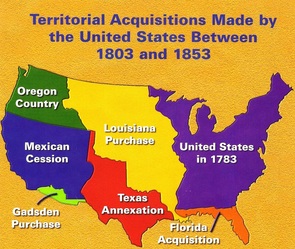 1853 – America and Mexico signed the Gadsden Treaty. Vice President William King died. Arctic explorer Elisha Kane ventures farther north than any man has before.
1853 – America and Mexico signed the Gadsden Treaty. Vice President William King died. Arctic explorer Elisha Kane ventures farther north than any man has before.
1854 – Franklin Pierce was re-elected. The Kansas-Nebraska Act was passed and great conflict occurs, probably as a result, for reasons related to politics and slavery, but as a public school educator I don’t like to get involved in politics or controversial social issues, so… ask your parents, I guess.
1855 – William Lloyd Garrison published “Disunion!” in The Liberator and Walt Whitman published Leaves of Grass. There are people who find both of these things signficant in different ways, so you might look into that. It’s complicated.
1856 – Henry Bessemer invented a process for mass production of steel. John Brown led raids against pro-slavery families in Kansas and five men were beheaded. He became a controversial figure about whom I have absolutely no insight or opinion because – controversy! (I could point you to some articles but we’re really running out of time here, so…)
1856 – James Buchanan was elected President.
1857 – The Supreme Court issued their decision in Dred –
Crap. We’ve got five minutes and we haven’t talked about Harper’s Ferry or the Election of 1860 or Abraham Lincoln. Then again, if we talk more about Lincoln than we have Pierce or Buchanan, that’s suggesting he was more important than they were, which is a political judgment as well as a value judgment. It favors one party’s ideology over the other, and…
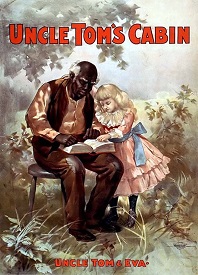
I must apologize, class. Instead of just teaching you the facts, I seem to still be picking and choosing which parts of history to cover. I’ve injected way too many of my own ideas about which things matter and what they mean. I just couldn’t help myself when Uncle Tom’s Cabin came up; it was just so important—
Er… in my opinion. For reasons I should keep to myself, because others disagree.
Dammit.
I’ll try to do better tomorrow when we cover the Civil War in a day. I won’t leave anything out or inject my own biases about which battles, people, or ideas were right or wrong or which mattered more than others, or whether ending slavery was a good idea or the war was unpleasant. I’ll just teach you some history. That is, after all, my job – right?
RELATED POST: Fact-Free History
RELATED POST: “Here’s Your Mule,” Part One – North vs. South
RELATED POST: Secession & Superiority (A Little Knowledge Is A Dangerous Thing, Part One)

 There’s nothing more terrifying than finding out your district administrators have just returned from a conference somewhere, and they’re excited about something. You know because they suddenly smile too much, and now they want to come talk to your department or hold a special faculty meeting. It’s enough to ruin your entire 17-minute lunch period.
There’s nothing more terrifying than finding out your district administrators have just returned from a conference somewhere, and they’re excited about something. You know because they suddenly smile too much, and now they want to come talk to your department or hold a special faculty meeting. It’s enough to ruin your entire 17-minute lunch period.
 You know where it’s going from there. It’s time to do more PBL (Project Based Learning). More STEALHAM (Science Technology Engineering Arts Literacy History Athletics Math). More opinions and less reality – because if we teach the way we were taught in the past we’ll create the future we dreaded in our former present! We’re preparing kids for jobs that don’t exist yet, so we need to light more fires and fill fewer buckets if we’re going to fail forward…
You know where it’s going from there. It’s time to do more PBL (Project Based Learning). More STEALHAM (Science Technology Engineering Arts Literacy History Athletics Math). More opinions and less reality – because if we teach the way we were taught in the past we’ll create the future we dreaded in our former present! We’re preparing kids for jobs that don’t exist yet, so we need to light more fires and fill fewer buckets if we’re going to fail forward… On the other hand, it’s a shame to think any civilized young person would be set loose on the world without a pretty good idea of what the Civil War was, roughly when it occurred, and some of the major changes it brought about. It’s unforgiveable if we don’t at least try to ensure that same youth understands the three branches of government and has a general grasp of how each is supposed to work.
On the other hand, it’s a shame to think any civilized young person would be set loose on the world without a pretty good idea of what the Civil War was, roughly when it occurred, and some of the major changes it brought about. It’s unforgiveable if we don’t at least try to ensure that same youth understands the three branches of government and has a general grasp of how each is supposed to work. And it’s even more essential that we emphasize data and details when addressing contemporary issues. I’m a believer in everyone being entitled to their own opinion, but I’d rather not cement my students’ ignorance by encouraging them to wax emphatic on topics about which they know little.
And it’s even more essential that we emphasize data and details when addressing contemporary issues. I’m a believer in everyone being entitled to their own opinion, but I’d rather not cement my students’ ignorance by encouraging them to wax emphatic on topics about which they know little.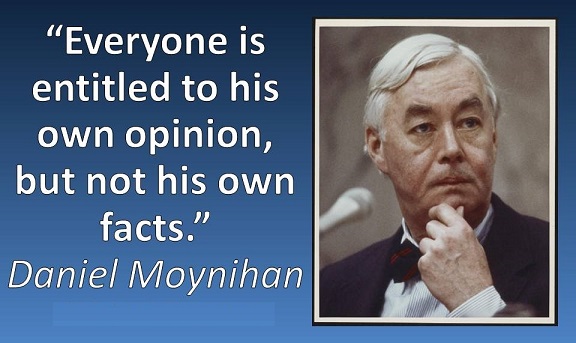 But if you’re in an academic setting, on academic time, pursuing academic goals, we should INSIST on statistics, data, experts, and records. We should at least TRY to be precise about names, dates, and other onerous “facts” before spewing our precious individuality about pretty much anything.
But if you’re in an academic setting, on academic time, pursuing academic goals, we should INSIST on statistics, data, experts, and records. We should at least TRY to be precise about names, dates, and other onerous “facts” before spewing our precious individuality about pretty much anything.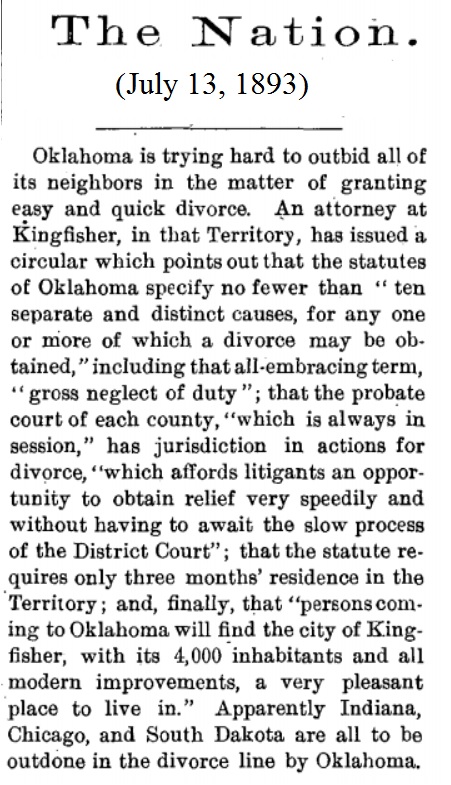 Oklahoma is trying hard to outbid all of its neighbors in the matter of granting easy and quick divorce. An attorney at Kingfisher, in that Territory, has issued a circular which points out that the statutes of Oklahoma specify no fewer than “ten separate and distinct causes, for any one or more of which a divorce may be obtained,” including that all-embracing term, “gross neglect of duty”…
Oklahoma is trying hard to outbid all of its neighbors in the matter of granting easy and quick divorce. An attorney at Kingfisher, in that Territory, has issued a circular which points out that the statutes of Oklahoma specify no fewer than “ten separate and distinct causes, for any one or more of which a divorce may be obtained,” including that all-embracing term, “gross neglect of duty”…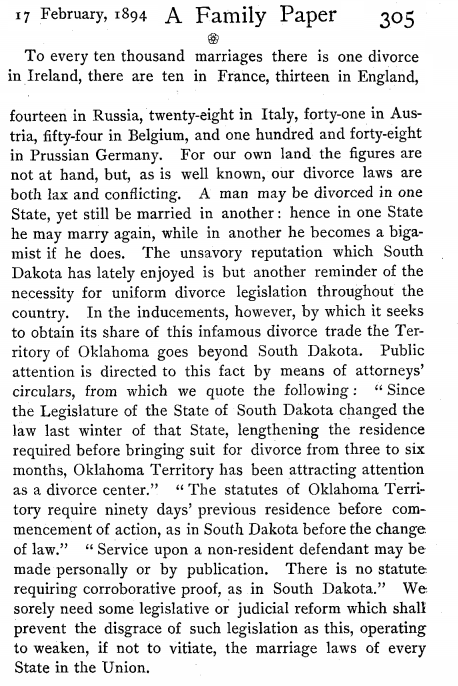
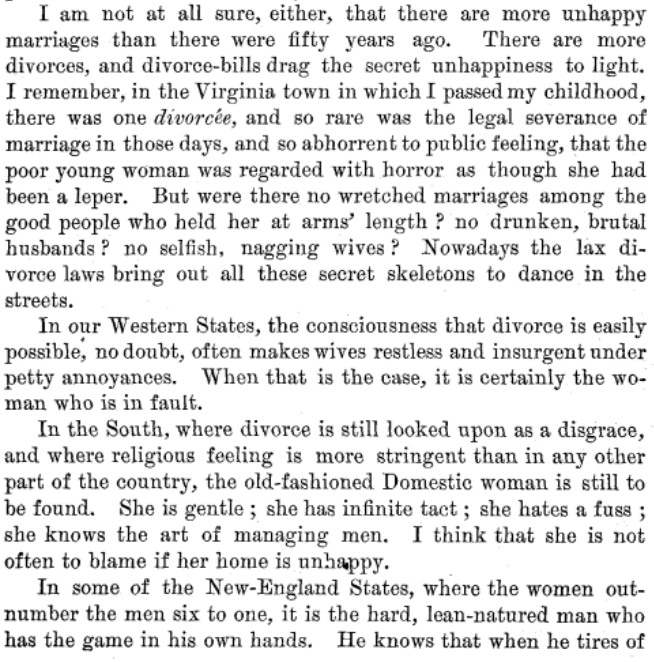
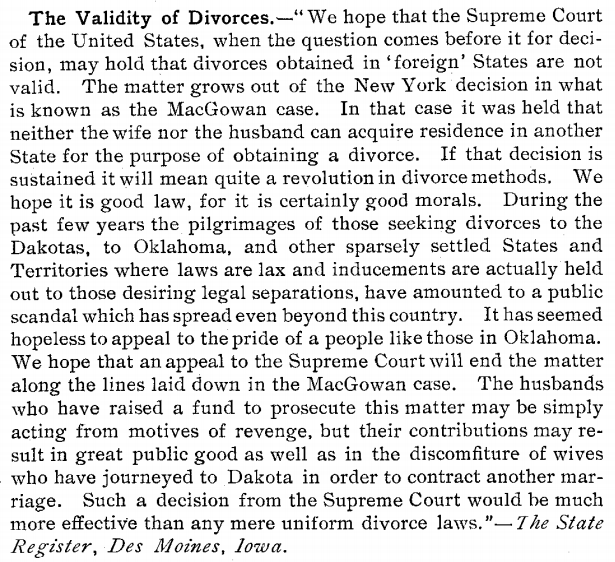
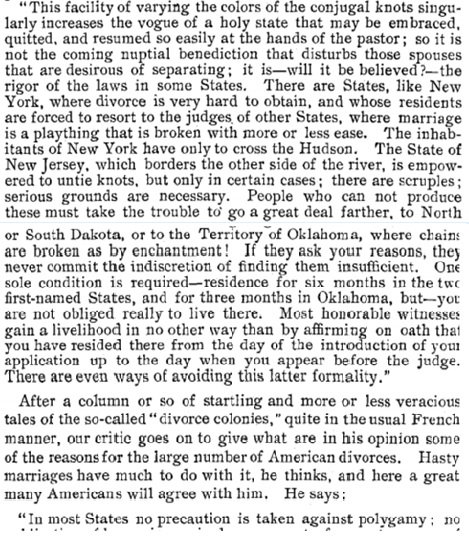

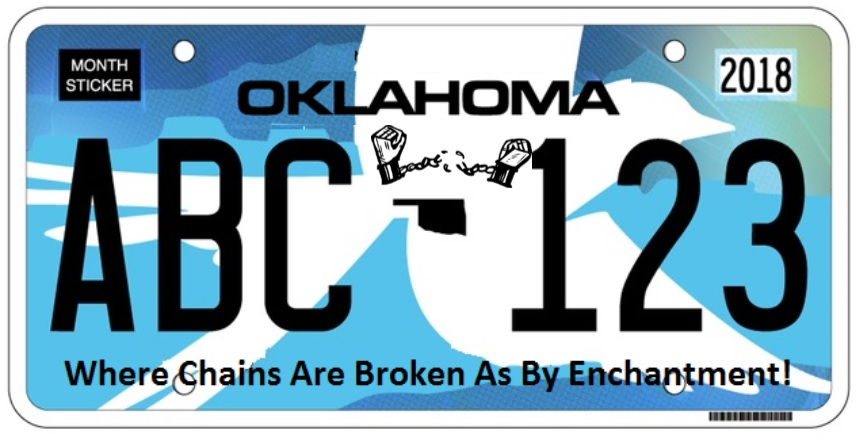
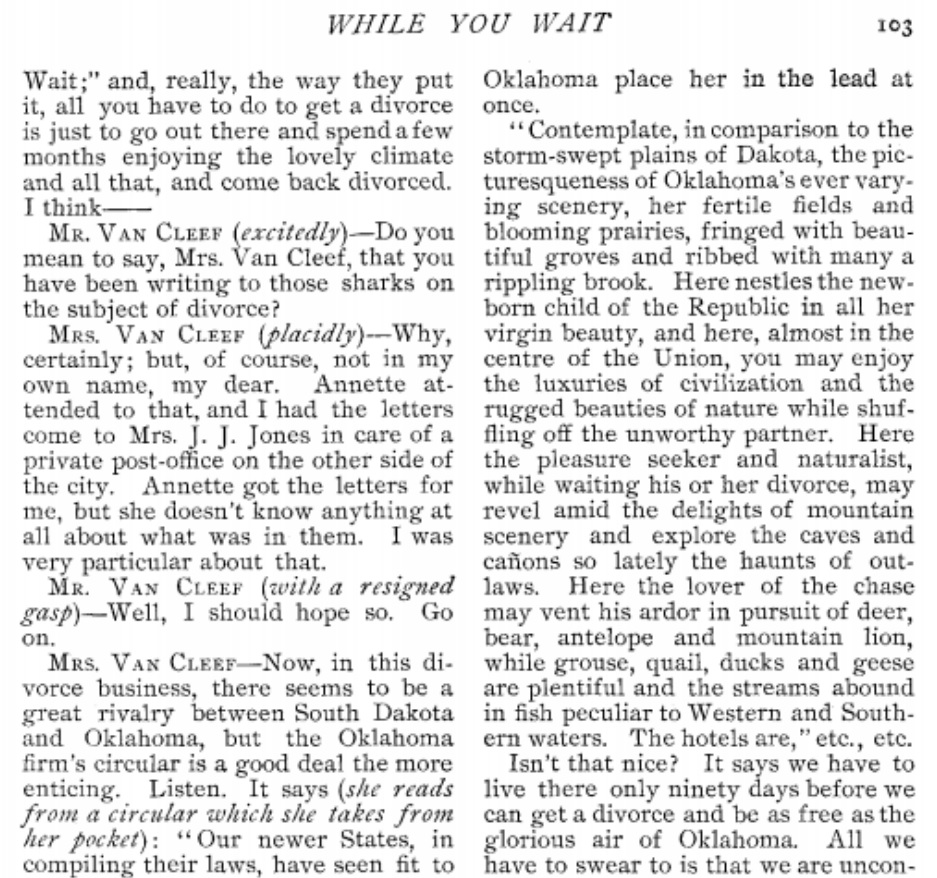
 There are folks you expect to write all fancy. Poets, for example. Certain flavors of novelists. Artsy musician types. George Will.
There are folks you expect to write all fancy. Poets, for example. Certain flavors of novelists. Artsy musician types. George Will.  Jefferson was an idealist – he genuinely believed a nation of ever-revolutionary small farmers was as close to heaven on earth as mankind could ever approach. And he does get there – “they generally will chuse wise men.” It’s just that the process, in his mind, must be carefully designed to accommodate those initial “crude secretions.”
Jefferson was an idealist – he genuinely believed a nation of ever-revolutionary small farmers was as close to heaven on earth as mankind could ever approach. And he does get there – “they generally will chuse wise men.” It’s just that the process, in his mind, must be carefully designed to accommodate those initial “crude secretions.”  It’s the same Latin root as ‘peculiar’ – uncommon, or distinctive. Go back far enough and it suggests property belonging or assigned to a specific person. Suddenly what seem like unrelated definitions start to make sense. ‘Peculium’ = someone’s stuff. ‘Pecuniary’ = related to wealth. ‘Peculiar’ = weird. All from ‘distinctive,’ but said fancy.
It’s the same Latin root as ‘peculiar’ – uncommon, or distinctive. Go back far enough and it suggests property belonging or assigned to a specific person. Suddenly what seem like unrelated definitions start to make sense. ‘Peculium’ = someone’s stuff. ‘Pecuniary’ = related to wealth. ‘Peculiar’ = weird. All from ‘distinctive,’ but said fancy. 

 And… “Oklahomaite”?
And… “Oklahomaite”? It is difficult for those of you with the slightest shred of decency to appreciate how the law and politics work. They do not operate according to anything most of us consider reasonable, moral, or even explicable. In the past they didn’t have to. Those affected had little expectation of being fully informed and no real control of the outcome.
It is difficult for those of you with the slightest shred of decency to appreciate how the law and politics work. They do not operate according to anything most of us consider reasonable, moral, or even explicable. In the past they didn’t have to. Those affected had little expectation of being fully informed and no real control of the outcome. And then the South began writing the history of the war and the events which led to it. The war they’d lost. The one fought over a variety of issues, but in which slavery and its continuation were central and essential as defined by the South in the very documents they issued to justify their cause.
And then the South began writing the history of the war and the events which led to it. The war they’d lost. The one fought over a variety of issues, but in which slavery and its continuation were central and essential as defined by the South in the very documents they issued to justify their cause. What’s less tolerable is the fervent hurt and chagrin evidenced by the South’s defenders at the very suggestion that secession had ANYTHING to do with slavery. It’s not that they wish to lay out a reasoned argument, you understand – it’s that they’ve reshaped history and historiography solely through repetition and strong emotion.
What’s less tolerable is the fervent hurt and chagrin evidenced by the South’s defenders at the very suggestion that secession had ANYTHING to do with slavery. It’s not that they wish to lay out a reasoned argument, you understand – it’s that they’ve reshaped history and historiography solely through repetition and strong emotion. My favorite hockey team captain after a tough loss and horrible officiating: “There were some tough calls, but the real problem is that we didn’t take care of business in our own end. We let too many pucks get past us and didn’t take advantage of our opportunities.”
My favorite hockey team captain after a tough loss and horrible officiating: “There were some tough calls, but the real problem is that we didn’t take care of business in our own end. We let too many pucks get past us and didn’t take advantage of our opportunities.” Of course, if the real issues were states’ rights-ish, that’s not as bad. Federalism is about balance, after all, and if perhaps the South got out of balance, that’s clearly rectified now. If anything, the central government is much stronger than originally intended as a result!
Of course, if the real issues were states’ rights-ish, that’s not as bad. Federalism is about balance, after all, and if perhaps the South got out of balance, that’s clearly rectified now. If anything, the central government is much stronger than originally intended as a result!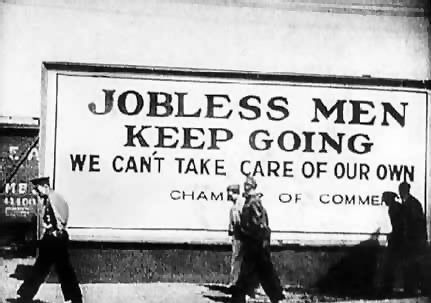 If our ideals are as flawless and our procedures as sound as we clearly wish to promote, then inequity and suffering must stem from personal or cultural failures. If America is ‘exceptional’ in the way those now in power demand we acknowledge, whatever failures have occurred within it are individual and not national. Potential solutions or cures must, logically, come from the same. Anything else is charity. Or enabling. Or corruption.
If our ideals are as flawless and our procedures as sound as we clearly wish to promote, then inequity and suffering must stem from personal or cultural failures. If America is ‘exceptional’ in the way those now in power demand we acknowledge, whatever failures have occurred within it are individual and not national. Potential solutions or cures must, logically, come from the same. Anything else is charity. Or enabling. Or corruption. I’ll close with a little Bible talkin’, since that seems to be such a motivator for those pushing a better whitewashing for our lil’uns. Whatever we may disagree on, I wholeheartedly concur that we’ve lost much in our upbringing if we feel the need to run from the wisdom found in
I’ll close with a little Bible talkin’, since that seems to be such a motivator for those pushing a better whitewashing for our lil’uns. Whatever we may disagree on, I wholeheartedly concur that we’ve lost much in our upbringing if we feel the need to run from the wisdom found in 